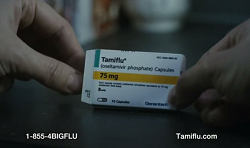 Roche's ($RHHBY) sometimes-blockbuster Tamiflu is one of only a couple of drugs approved for fighting influenza. But with generic competition brewing for the drug, the Swiss drugmaker is looking to the next possible thing in flu fighting meds, striking a deal with Shionogi for rights to its potential Tamiflu competitor.
Roche's ($RHHBY) sometimes-blockbuster Tamiflu is one of only a couple of drugs approved for fighting influenza. But with generic competition brewing for the drug, the Swiss drugmaker is looking to the next possible thing in flu fighting meds, striking a deal with Shionogi for rights to its potential Tamiflu competitor.
Roche has inked a development and sales deal with Shionogi to license outside of Japan and Taiwan, the Japanese company's anti-influenza drug S-033188, which has won fast-track designation in Japan. It expects the drug, assuming it is approved, to launch in 2018.
Shionogi says the drug is a cap-dependent endonuclease inhibitor and is expected to be a one-time, single-dose therapy, so it will be more convenient than other antiflu drugs and potentially more effective. Roche has provided Shionogi with an upfront payment and promised some undisclosed milestones. If approved, Roche would have global rights to the drug outside of Japan and Taiwan. That includes the U.S., where Roche gets most of its Tamiflu revenues.
Roche, which recently reported its results for 2015, said Tamiflu brought in $709.5 (CHF704 million) which was off 28%. That primarily was because of a mild flu season last year. In 2014, the antiviral fell just short of blockbuster sales at $966 million. The drug's sales are highly dependent on the seriousness of the flu season. During 2009's H1N1 swine flu outbreak, Tamiflu sales skyrocketed to 3.2 billion Swiss francs ($3.15 billion).
But Roche faces potential competition to Tamiflu in the U.S, which accounted for more than half of Roche's Tamiflu sales last year. Gilead ($GILD), which actually developed the drug and licensed it to Roche, has been fighting a patent challenge in the U.S. from India's Natco.
Tamiflu also remains controversial because some experts have said there is too little data to support the practice of governments stockpiling Tamiflu to protect their citizens in the event of a flu pandemic. A Roche-funded study published last year in The Lancet Respiratory Medicine, found that treating patients with neuraminidase inhibitors--of which Tamiflu is the leading choice--reduced the risk of death by 19% over no treatment at all.
- here's the Shionogi release (PDF)